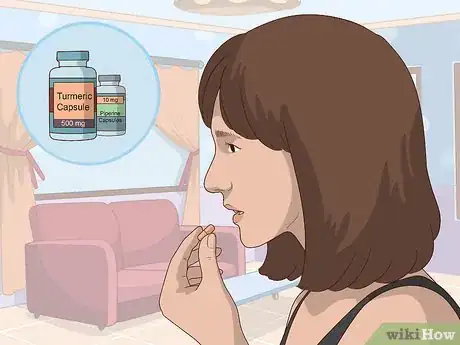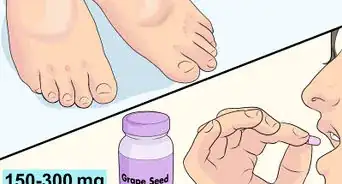This article was co-authored by Lisa Bryant, ND and by wikiHow staff writer, Christopher M. Osborne, PhD. Dr. Lisa Bryant is Licensed Naturopathic Physician and natural medicine expert based in Portland, Oregon. She earned a Doctorate of Naturopathic Medicine from the National College of Natural Medicine in Portland, Oregon and completed her residency in Naturopathic Family Medicine there in 2014.
There are 7 references cited in this article, which can be found at the bottom of the page.
This article has been viewed 9,074 times.
Whether you use the whole root or the distinctive yellow powder, turmeric makes a flavorful addition to curries and a wide range of other dishes. Curcumin, the key component in turmeric, also has anti-inflammatory and antioxidant properties that may help prevent or treat a range of medical conditions. If you’re interested in taking turmeric supplements, start by talking to your doctor about the potential benefits and risks. If you do start a turmeric supplement regimen, follow your doctor’s dosing instructions and consider finding turmeric with black pepper or adding a piperine supplement as well.
Steps
Choosing and Taking Supplements
-
1Talk to your doctor before starting on turmeric supplements. Curcumin, the key component in turmeric, is generally safe for most people to take. That said, play it safe and check with your doctor before starting a supplement regimen. Turmeric may not be a safe choice for you if any of the following are true:[1]
- You use blood thinners and/or nonsteroidal anti-inflammatory drugs. These medications reduce your blood’s clotting ability, and curcumin can compound this effect and increase your bleeding risk.
- You take certain other prescription medications. Your doctor will go through the list of medications you take to check for potentially dangerous interactions with high doses of curcumin.
- You are pregnant or nursing. High doses of curcumin can have uncertain but potentially harmful impacts on a fetus or infant.
- You have low blood sugar or blood pressure levels. Curcumin can further lower these, potentially to dangerous levels if they’re already low.
- You have gallstones, or a bile duct or passage obstruction.[2]
-
2Buy 500 mg capsules from a reputable supplement source. In the U.S. and many other nations, supplements are not nearly as tightly regulated as are medications. To improve your odds of getting a safe, high-quality product, shop at a reputable supplement retailer—like a pharmacy, health and wellness store, or supermarket—and buy recognized, well-regarded brands.[3]
- Ask your doctor or pharmacist for advice on buying supplements.
- 500 mg turmeric capsules often contain 450 mg of turmeric powder and 50 mg of turmeric extract. Check the label to confirm that turmeric is the primary ingredient.
Advertisement -
3Get 10 mg piperine capsules as well if your doctor recommends it. Piperine, which is a key component in black pepper, has been proven to greatly increase curcumin’s “bioavailability.” In basic terms, piperine makes it far easier for your body to absorb the curcumin instead of letting it pass through. Clinical studies of turmeric often pair 500 mg of curcumin with 10 mg of piperine, so ask your doctor if you should follow this dosage pairing.[4]
- As with turmeric supplements, get piperine capsules from a reputable source and check the label carefully.
-
4Take a 500 mg and 10 mg capsule 1-3 times per day or as advised. There’s no single “standard” dosage of turmeric that clearly provides health benefits. That said, clinical study participants often take a 500 mg curcumin capsule and a 10 mg piperine capsule twice per day. Your doctor may advise this 1000 mg daily curcumin total, or recommend that you take less or more.[5]
- Regardless of how much turmeric you’re advised to take, you’ll likely be directed to take 10 mg of piperine per 500 mg of curcumin.
- You may find it most convenient to take a dose in the morning and one in the evening, but there’s no evidence that the timing of the doses makes a significant impact.
Warning: While some studies support taking 4000 mg, 8000 mg, or even 12000 mg of turmeric per day, do not take more than 1500 mg per day without specific guidance from your doctor.
-
5Swallow the capsules whole with water and with or without food. There’s no special technique required to take turmeric supplements. Pop the capsule in your mouth, take a sip of water, and swallow. Follow up with the piperine if you’re taking it as well. You can take both supplements before a meal, during a meal, after a meal, or between meals.[6]
- If you have trouble swallowing pills, talk to your doctor. It may be possible to open the capsules, sprinkle the contents onto applesauce, and swallow a spoonful whole. However, the applesauce may have a pungent flavor of concentrated turmeric and/or pepper!
-
6Stop taking turmeric supplements if you notice any serious side effects. Although turmeric may in some cases help manage gastrointestinal (GI) conditions like irritable bowel syndrome (IBS), it can also sometimes cause GI symptoms like diarrhea and nausea, especially at high doses if taken long term. If these symptoms occur, you may need to reduce your dosage or stop taking turmeric supplements altogether.[7]
- Other possible side effects include headaches or dizziness. Allergic reactions are rare but possible, so get help right away if you experience blue lips, trouble breathing, or other signs of a serious allergic reaction.
- Unusual bruises or cuts that won’t stop bleeding quickly are signs of a potential clotting issue. Stop using turmeric and contact your doctor right away.
Adding Turmeric to Your Diet
-
1Sprinkle turmeric powder into dishes late in the cooking process. While turmeric is most famous as an ingredient in curries, you can add about 0.125 tsp (1.75 g) per serving to just about any dish without it being noticeable. To get the maximum health benefit, add turmeric near the end of the cooking process. Prolonged exposure to high heat can negatively impact the beneficial curcumin.[8]
- Try turmeric in eggs, beans, soups, roasted veggies, or just about any savory dish.
- While high doses of turmeric can cause gastrointestinal discomfort and, in some cases, interact with other medications, it is virtually impossible to reach a high dosage threshold through dietary consumption alone. Talk to your doctor if you have any concerns, however.
-
2Try turmeric tea, milk, and smoothies as refreshing beverage options. For a quick and easy turmeric tea, boil 0.25 tsp (3.5 g) of turmeric powder in 8 fl oz (240 ml) of water for 10 minutes, then add any sweeteners or flavorings you prefer. Or, try turmeric “golden milk” or turmeric smoothies:[9]
- For “golden milk,” heat 8 fl oz (240 ml) of milk, 1 tsp (15 g) of turmeric powder, 1 tsp of ginger powder, 1 tsp (5 ml) of coconut oil, 1 dash of black pepper, and any sweeteners of your choice to taste.
- Add 0.5 tsp (7.5 g) of turmeric powder to practically any smoothie recipe. Recipes that include berries or green tea will provide an extra antioxidant boost![10]
-
3Mix 0.25 tsp (3.5 g) of black pepper and 0.25 c (60 g) of turmeric powder for a piperine boost. On its own, the curcumin in turmeric is poorly absorbed before it exits your body. However, its “bioavailability” is greatly increased when it’s paired with piperine, which is found in black pepper. To ensure this boost, mix up your own spice blend that combines a small amount of finely-ground black pepper and a good-quality powdered turmeric.[11]
- Aim for a ratio of around 17 parts turmeric to 1 part black pepper. At this ratio, the black pepper will have little impact on the flavor of the turmeric.
References
- ↑ https://www.livescience.com/41760-turmeric-supplement-facts.html
- ↑ https://www.drugs.com/mtm/turmeric.html
- ↑ https://www.drugs.com/npp/turmeric.html
- ↑ https://www.drugs.com/npp/turmeric.html
- ↑ https://www.drugs.com/npp/turmeric.html
- ↑ https://www.ncbi.nlm.nih.gov/pmc/articles/PMC5664031/
- ↑ https://www.ncbi.nlm.nih.gov/pmc/articles/PMC5664031/
- ↑ https://www.healthyandnaturalworld.com/turmeric-smoothie-recipes-to-boost-bioavailability/
- ↑ https://www.healthy-eating-support.org/how-to-use-turmeric.html



























































Medical Disclaimer
The content of this article is not intended to be a substitute for professional medical advice, examination, diagnosis, or treatment. You should always contact your doctor or other qualified healthcare professional before starting, changing, or stopping any kind of health treatment.
Read More...